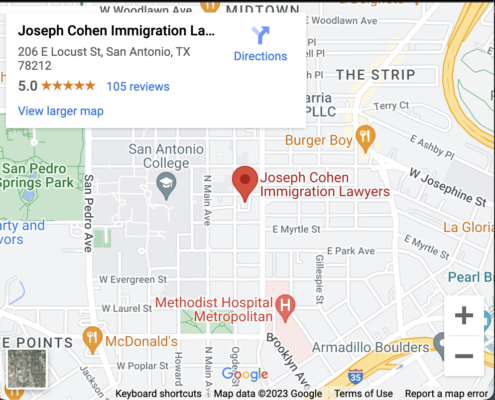
Joseph Cohen is a deportation lawyer in San Antonio, Texas who helps clients facing deportation and removal. Removal is the modern term for what is commonly referred to as deportation. Are you facing deportation and removal because you were charged with a crime or convicted of a crime? What crimes can get you deported in San Antonio, Texas?
Under the law, individuals can be removed or deported if they commit certain crimes. A criminal history can also prevent a person from obtaining or renewing a green card or other lawful status. Unfortunately, the law doesn’t always clearly define the crimes that qualify a person for removal or deportation. For example, individuals can be removed for crimes involving moral turpitude, as well as aggravated felonies. While aggravated felonies are statutorily defined, crimes involving moral turpitude are not as neatly defined. However, both can lead to removal.
What is a crime of moral turpitude? Courts use words like reprehensible act and conduct that shocks the public conscious. Certain crimes such as arson, burglary, or fraud may be considered crimes involving moral turpitude. On the other hand, crimes that may not be a crime involving moral turpitude include simple assault without injury, driving while intoxicated and joyriding.
Immigration concerns federal law, but many convictions are under state criminal laws. Analyses of whether a criminal conviction is a ground for removal can be complex in comparing state and federal statutes. In addition, admissions in some cases without a conviction can trigger removal. If your lawyer can argue that the crime shouldn’t qualify, you may be able to prevent your deportation or removal. Certain individuals may be protected from removal even with a conviction of a crime involving moral turpitude. For example, if you have lived in the U.S. for more than five years and then committed a “crime of moral turpitude,” you may not be removable. Before taking any steps in a criminal or immigration case, contacting a lawyer can be important.
If you are facing aggravated felony charges, it is important to understand that these can carry severe immigration consequences of removal, often with very little defense. Such crimes can include murder, drug related crimes, perjury and others. Individuals convicted of aggravated felonies can be removed from the U.S. even if they are legal permanent residents. Even you think that your criminal charges are minor, before pleading guilty or admitting to any charge, you should speak to a deportation lawyer like J. Joseph Cohen in San Antonio, Texas to learn more about how a criminal charge can impact your situation.
Crimes That Can Impact Citizenship Applications
What happens if you are applying for citizenship and you have a criminal record. Could you face deportation or lose the ability to become a citizen? Individuals who have a criminal record should always speak to a deportation lawyer before applying for citizenship. In some cases, applying for citizenship with a criminal record could initiate deportation proceedings. Laws regarding who should and should not apply for citizenship can be highly complicated. Naturalization requires a showing of good moral character. Before applying for citizenship, it is important to understand your options and rights, and to understand whether your criminal record might have a negative impact on your legal status. Certain crimes can prevent the required showing of good moral character and permanently bar you from becoming a citizen such as aggravated felonies. If you committed a less major crime, you may have to wait a certain amount of time before you can apply for citizenship and be allowed to show immigration authorities that you are a person of good moral character.
For example, there are some crimes that can temporarily bar you from applying for citizenship. These include certain drug crimes, illegal gambling, or other crimes. If you spent 180 or more days in jail, you could also face challenges when applying for citizenship. If you have a criminal record and are not permanently barred, you may need to submit additional evidence to show that you have good moral character. This might include character references from the community, or evidence of your ongoing good behavior, rehabilitation and good citizenship. Have questions about this? Reach out to J. Joseph Cohen, a deportation lawyer in San Antonio, Texas today.
Have Questions About Whether You Can Be Deported?
Being convicted, or in some cases merely admitting to a crime, can trigger removal or deportation proceedings. A criminal history can disqualify a person from becoming a citizen and prevent renewal of a green card or other lawful status. Have questions about your rights and options when it comes to deportation and having a criminal record? Reach out to J. Joseph Cohen, a deportation lawyer in San Antonio, Texas today. I can work with you to find the best possible option for going forward.



